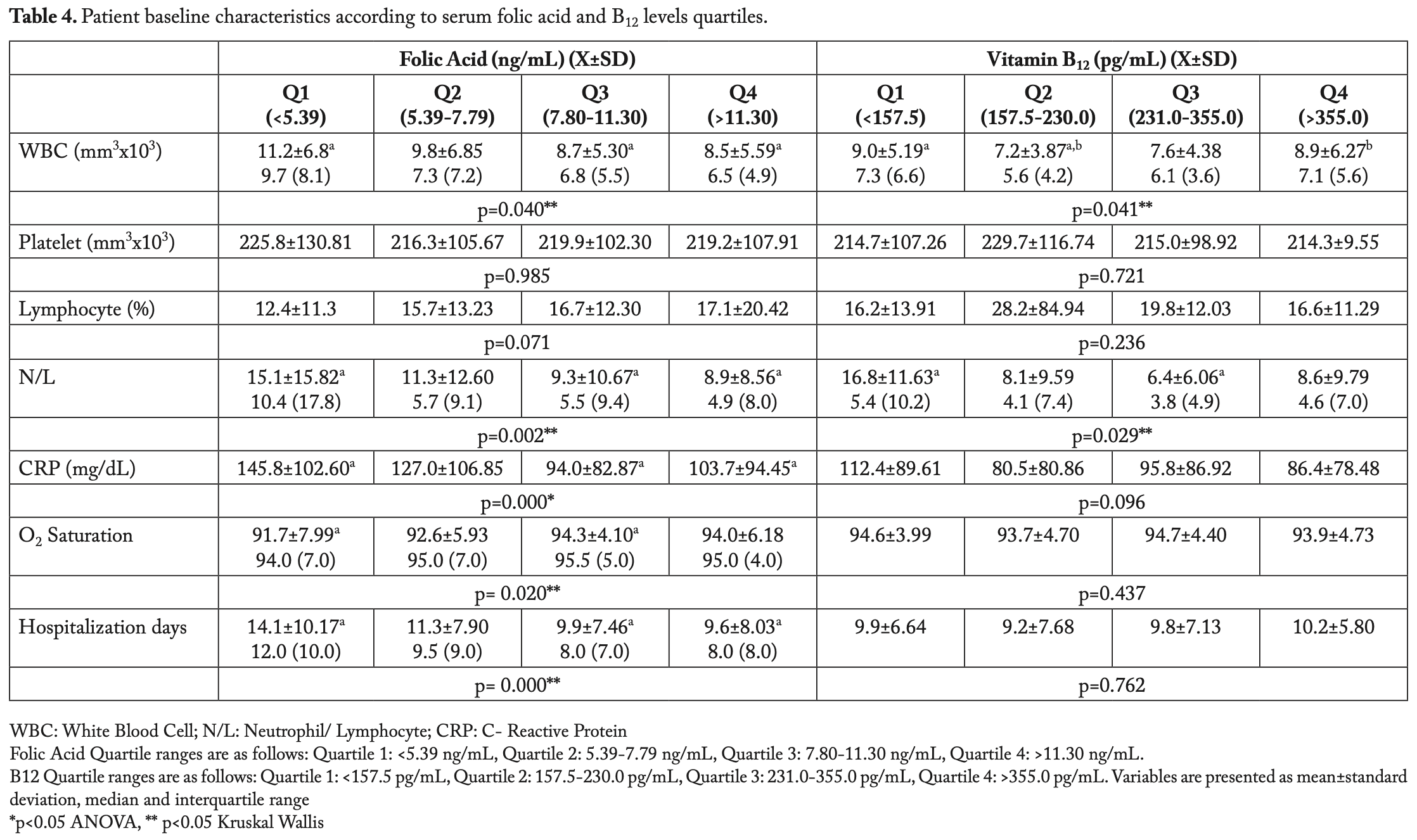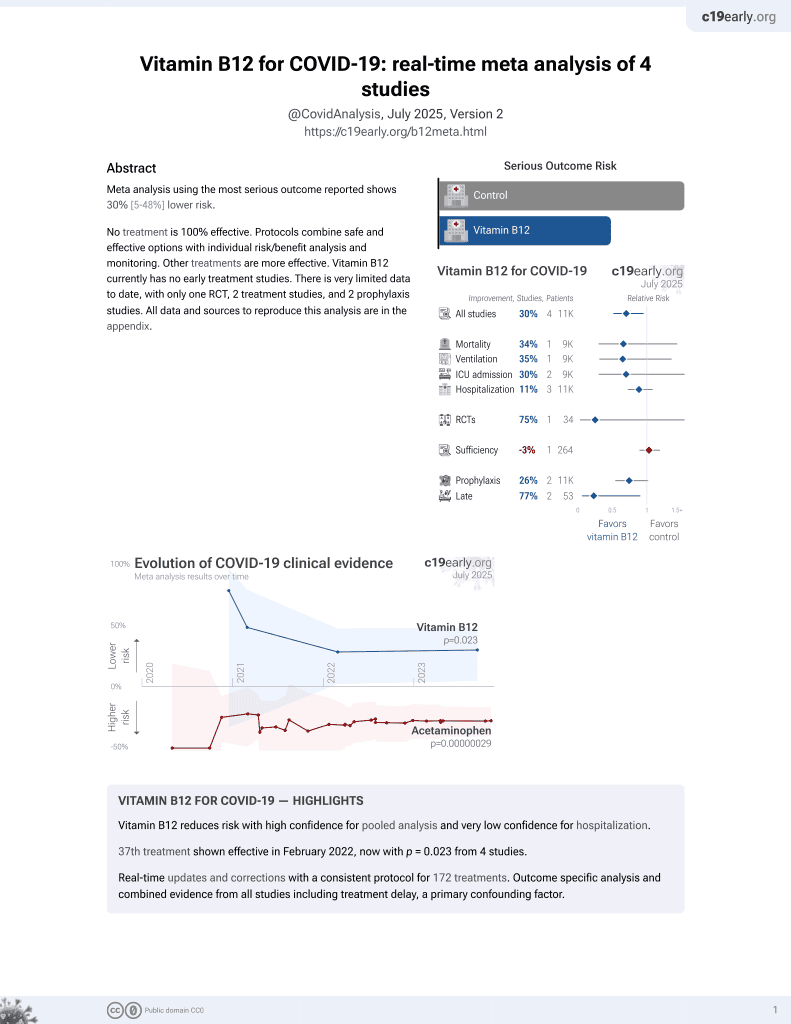
Association between low serum folic acid and vitamin B12 levels with COVID-19 prognosis
et al., Progress in Nutrition, doi:10.23751/pn.v24i3.13462, Sep 2022
38th treatment shown to reduce risk in
February 2022, now with p = 0.023 from 4 studies.
Lower risk for recovery.
No treatment is 100% effective. Protocols
combine treatments.
6,400+ studies for
210+ treatments. c19early.org
|
Retrospective 529 hospitalized COVID-19 patients in Turkey showing lower serum folic acid levels associated with longer hospitalization and higher mortality. Folic acid deficiency and insufficiency were common. There was no significant association for vitamin B12 levels and outcomes. Authors hypothesize that folic acid may support the immune response against SARS-CoV-2 and reduce inflammation.
Study covers vitamin B9 and vitamin B12.
|
hospitalization time, 3.0% higher, relative time 1.03, p = 0.70, treatment mean 10.2 (±5.8) n=132, control mean 9.9 (±6.64) n=132.
|
| Effect extraction follows pre-specified rules prioritizing more serious outcomes. Submit updates |
Keskin et al., 27 Sep 2022, retrospective, Turkey, peer-reviewed, mean age 62.8, 3 authors, study period April 2019 - October 2021.
Association Between Low Serum Folic Acid and Vitamin B 12 Levels with Covid-19 Prognosis
doi:10.23751/pn.v24i3.13462
Background and aim: It is important that the immune system is active and strong in protection from the COVID-19 pandemic. Folic acid and vitamin B 12 are involved in the initiation, maintenance and regulation of both innate and adaptive immune reactions of the host against infections. In this study, it was aimed to investigate the relationship between serum folic acid and vitamin B 12 levels of COVID-19 patients on the prognosis of the disease. Methods: The sample of the study consists of 529 individuals hospitalized in the Pandemic Chest Diseases Intensive Care Unit. General characteristics of the individuals, biochemical parameters checked routinely (white blood cell (WBC), platelet (PLT), lymphocyte, Neutrophil/Lymphocyte (N/L) rate, C-reactive protein (CRP), oxygen (O 2 ) saturation at the time of admission), serum vitamin B 12 and folic acid levels, length of stay in intensive care units (ICUs) and hospitalization, and mortality were recorded. Results: The mean age of individuals was 62.8±15.12 years, and 50.9% were men and 49.1% were women. The mean level of serum folic acid in the subjects was 9.1±4.91 (ng/mL), and 2.4% had folic acid deficiency and 28.4% had folic acid insufficiency. The mean serum vitamin B 12 was 295.6±229.98 (pg/mL), and vitamin B 12 deficiency was observed only in 14.4%. The increase in serum folic acid levels reduces the total length of hospitalization and the risk of mortality (p<0.05). On the other hand, no correlation was found between B 12 levels and the length of stay in ICU, hospitalization, and mortality. It was shown that WBC and N/L rates decreased as serum folic acid levels increased, and O 2 saturation at the first hospital admission was higher. Conclusions: Folate deficiency and insufficiency are common among hospitalized COVID-19 patients and cause progression to severe disease. Therefore, examining COVID-19 patients in terms of nutritional deficiencies is critical in monitoring the clinical outcomes of the disease.
Conflict of Interest: All authors declare no conflict of interest related to this study.
References
Acosta-Elias, Espinosa-Tanguma, The folate concentration and/or folic acid metabolites in plasma as factor for COVID-19 infection, Front Pharmacol
Calder, Nutrition, immunity and COVID-19, BMJ Nutr Prev Health
Dalbeni, Bevilacqua, Teani, Normelli, Mazzaferri et al., Excessive vitamin B12 and poor outcome in COVID-19 pneumonia, Nutr Metab Cardiovasc Dis
Ersöz, Yılmaz, The association between micronutrient and hemogram values and prognostic factors in COVID-19 patients: A single-center experience from Turkey, Int J Clin Pract
Fedele, Francesco, Riso, Collo, Obesity, malnutrition, and trace element deficiency in the coronavirus disease (COVID-19) pandemic: an overview, Nutr
Gasmi, Tippairote, Mujawdiya, Micronutrients as immunomodulatory tools for COVID-19 management, Clin Immunol
Hu, Huang, Yin, The cytokine storm and COVID-19, J Med Virol
Ibrahimagić, Kunić, Comment on an article: "High dose folic acid is a potential treatment for pulmonary hypertension, including when associated with COVID-19 pneumonia, Med Hypotheses
Iddir, Brito, Dingeo, Strengthening the immune system and reducing inflammation and oxidative stress through diet and nutrition: considerations during the COVID-19 crisis, Nutrients
Itelman, Wasserstrum, Segev, Clinical Characterization of 162 COVID-19 patients in Israel: Preliminary Report from a Large Tertiary Center, Isr Med Assoc J
Jayawardena, Sooriyaarachchi, Chourdakis, Jeewandara, Ranasinghe et al., Enhancing immunity in viral infections, with special emphasis on COVID-19: A review, Diabetes Metab Syndr
Kumar, Kancharla, Jena, In silico virtual screening-based study of nutraceuticals predicts the therapeutic potentials of folic acid and its derivatives against COVID-19, Virusdisease
Kürklü, Keskin, Türker, Is High Body Mass Index a Risk Factor for COVID-19?, Bezmialem Sci
Meisel, Efros, Bleier, Folate levels in patients hospitalized with coronavirus disease 2019, Nutrients
Serseg, Benarous, Yousfi, Hispidin and Lepidine E: two Natural Compounds and Folic acid as Potential Inhibitors of 2019-novel coronavirus Main Protease (2019-nCoVMpro), molecular docking and SAR study, Curr. Comput.-Aided Drug Des
Shakeri, Azimian, Ghasemzadeh-Moghaddam, Evaluation of the relationship between serum levels of zinc, vitamin B12, vitamin D, and clinical outcomes in patients with COVID-19, J Med Virol
Shakoor, Feehan, Mikkelsen, Be well: A potential role for vitamin B in COVID-19, Maturitas
Sheybani, Dokoohaki, Negahdaripour, The role of folic acid in the management of respiratory disease caused by COVID-19
Siordia, Epidemiology and clinical features of COVID-19: A review of current literature, J Clin Virol
Spence, Yi, Hankey, B vitamins in stroke prevention: time to reconsider, Lancet Neurol
Taheri, Bahrami, Habibi, Nouri, A review on the serum electrolytes and trace elements role in the pathophysiology of COVID-19, Biol Trace Elem Res
Tek, Koçak, Koronavirüsle (Covid-19) Mücadelede Beslenmenin Bağişiklik Sisteminin Desteklenmesinde Rolü. Gazi Sağlık Bil Derg, Özel Sayı
Wee, COVID-19's toll on the elderly and those with diabetes mellitus-is vitamin B12 deficiency an accomplice?, Med Hypotheses
Wiltshire, Peña, Mackenzie, Shaw, Couper, High dose folic acid is a potential treatment for pulmonary hypertension, including when associated with COVID-19 pneumonia, Med Hypotheses
Şenyiğit, COVID-19 Pandemisi. Klinik, Tanı, Tedavi ve Korunma, Dicle Tip Derg
DOI record:
{
"DOI": "10.23751/pn.v24i3.13462",
"ISSN": "1129-8723",
"URL": "https://doi.org/10.23751/pn.v24i3.13462",
"abstract": "Background and aim: It is important that the immune system is active and strong in protection from the COVID-19 pandemic. Folic acid and vitamin B12 involved in the initiation, maintenance and regulation of both innate and adaptive immune reactions of the host against the infections. In this study, it was aimed to investigate the relationship between serum folic acid and vitamin B12 levels of COVID-19 patients on the prognosis of the disease. Methods: The sample of the study consists of 529 individuals hospitalized in the Pandemic Chest Diseases Intensive Care Unit. General characteristics of the individuals, biochemical parameters checked routinely (white blood cell (WBC), platelet (PLT), lymphocyte, Neutrophil/Lymphocyte (N/L) rate, C-reactive protein (CRP), oxygen (O2) saturation at the time of admission), serum vitamin B12 and folic acid levels, length of stay in intensive care unit (ICU) and hospitalization, and mortality were recorded. Results: The mean age of individuals was 62.8±15.12 years, and 50.9% were men and 49.1% women. The mean level of serum folic acid in the subjects was 9.1±4.91 (ng/mL), and 2.4% had folic acid deficiency and 28.4% had folic acid insufficiency. The mean serum vitamin B12 was 295.6±229.98 (pg/mL), and vitamin B12 deficiency was observed only in 14.4%. The increase in serum folic acid levels reduces the total length of hospitalization and the risk of mortality (p<0.05). On the other hand, no correlation was found between B12 levels and the length of stay in ICU, hospitalization and mortality. It was shown that WBC and N/L rate decreased as serum folic acid levels increased, and O2 saturation at the first hospital admission was higher. Conclusions: Folate deficiency and insufficiency are common among hospitalized COVID-19 patients and cause progression to severe disease. Therefore, examining COVID-19 patients in terms of nutritional deficiencies is critical in monitoring the clinical outcomes of disease",
"author": [
{
"family": "Keskin",
"given": "Olgun"
},
{
"family": "Seremet Keskin",
"given": "Ayşegül"
},
{
"family": "Nilgün Seremet",
"given": "Nilgün Seremet"
}
],
"container-title": "Progress in Nutrition",
"issue": "3",
"issued": {
"date-parts": [
[
2022,
9,
27
]
]
},
"language": "eng",
"medium": "JB",
"page": "e2022104",
"page-first": "e2022104",
"publisher": "Mattioli 1885",
"publisher-place": "IT",
"title": "Association between low serum folic acid and vitamin B12 levels with COVID-19 prognosis",
"type": "article-journal",
"volume": "24"
}
keskin
